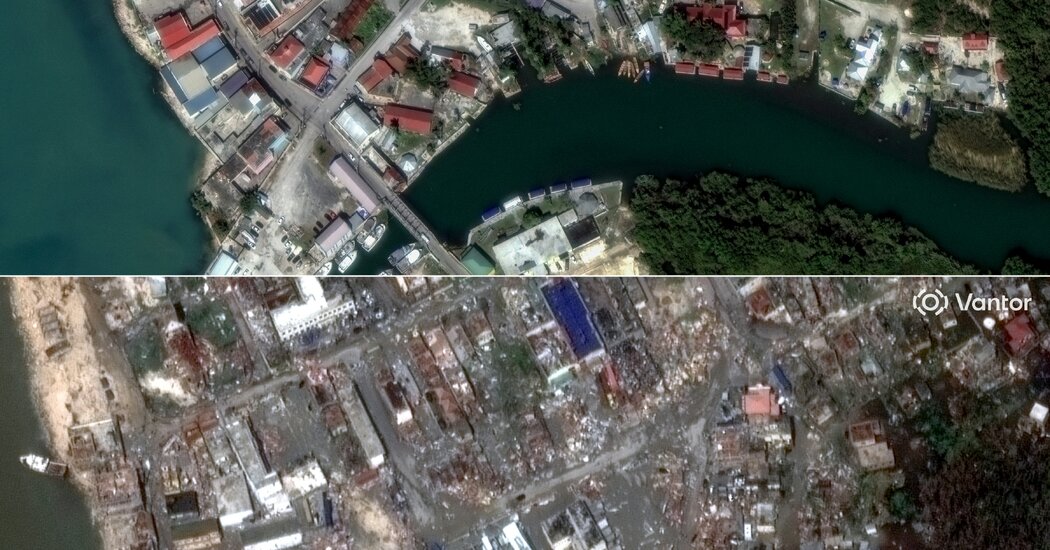Black River on Wednesday was unrecognizable to people there: The coastline was strewed with massive boulders, and a cellphone tower had twisted into a semicircle.
“Only places that have four concrete walls are still standing, and usually their roofs are gone,” said Amiri Bradley, who frequently visits the port town.
Black River, the capital of St. Elizabeth Parish on Jamaica’s southwestern coast, has long been known as the spot where the Black River meets the sea, once a key port where enslaved people packed sugar and rum onto ships. It later became a beloved spot for crocodile safaris or calm holidays at the Waterloo Guest House, which is said to have been the first private home in Jamaica lit by electricity.
That hotel, along with the town’s courthouse, library, churches and other historical buildings, has now been reduced to rubble by Hurricane Melissa, according to Prime Minister Andrew Holness of Jamaica, who took an aerial tour of the coast on Wednesday and said that Black River “has literally been totally destroyed.”
The hurricane came ashore Jamaica packing 185 m.p.h. winds on Tuesday, the island’s strongest storm on record. It hit a stretch of coast still recovering from Hurricane Beryl, which passed offshore as a Category 4 storm last year.
By Wednesday afternoon, five bodies had been found in St. Elizabeth Parish, including at least two in Black River. The town’s mayor, Richard Solomon, struggled to describe the extent of the damage.
“We were hit very hard. Total devastation,” Mr. Solomon said in a spotty phone interview. He was, he said, trying to “classify the level of disaster that we are experiencing here.”
Mr. Solomon estimated that 16 feet of storm surge engulfed parts of the town, which, he said, was home to some 8,000 people. Both the hospital and fire station had either been destroyed or severely damaged. Emergency supplies were wiped out when a container carrying them was overturned by the flood waters.
As waters rose on Tuesday night, Mr. Solomon said, he and dozens of others took refuge on the second floor of the fire station.
Coleridge Minto, superintendent of police for St. Elizabeth Parish, said, “We were bailing out, pushing out water.”
It was too late to find shelter anywhere else, he said, adding that “the water was covering the police cars outside.”
Soon, people started showing up at the station as the storm tore off their roofs. “As their houses started to crumble, they made their way to the station, and that included children,” he said.
On Wednesday, Black River was still virtually cut off from the rest of the parish because of blocked roads and at least one washed-out bridge, officials said. The relative of one victim walked 15 miles to the police station to report their loved one dead, according to Superintendent Minto.
“We feel a bit marooned right now,” the mayor said.
Mr. Bradley, who was visiting Black River, described a similar scene of chaos. By Tuesday afternoon, he said, the wind had started to pry off the roof of his large family home, and he and others sought shelter in a car.
“We had the car in the garage surrounded by concrete walls,” said Mr. Bradley, 27. “So that was kind of our safest bet.”
They eventually emerged, running to his aunt’s home, where a partial concrete structure had withstood previous storms, he said.
Daylight revealed mostly roofless homes, downed power lines, the crunched cellphone tower and the boulders that weighed hundreds of pounds tossed into bashed homes.
“I think it’s because those rocks were probably flying — right at all of those houses,” said Mr. Bradley. “There are some that are just completely level, where there’s nothing there.”
After a frantic rush to account for friends and relatives, many of them older and some injured by falling debris, residents began to wander the streets, sharing reserves of food and water, Mr. Bradley said.
Walking familiar terrain, he went toward the place where the Waterloo Guest House once was.
“It’s absolutely gone,” he said. “I turned around and it’s just a pile of wood.”
Frances Robles contributed reporting.
Annie Correal reports from the U.S. and Latin America for The Times.
The post Melissa Leaves Black River, Centuries-Old Jamaican Port Town, ‘Totally Destroyed’ appeared first on New York Times.




